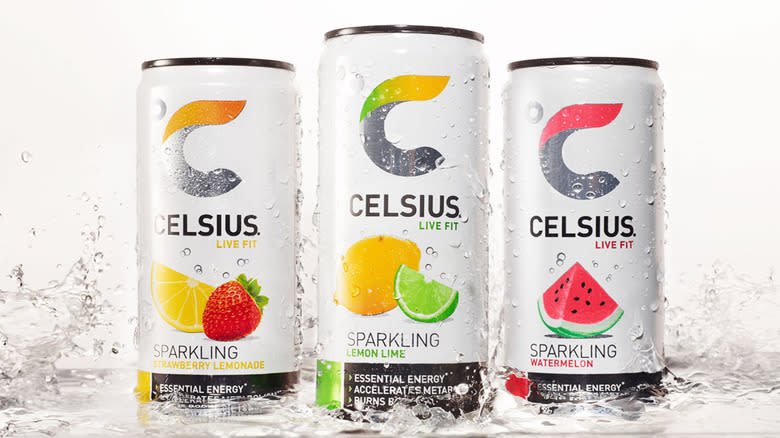Celsius Energy Drinks Vs. Coffee: The Ultimate Caffeine Face-Off

People needing a boost have turned to coffee for hundreds of years. But the 21st century has brought an enormous mix of energy drinks to the market, offering diverse alternatives to the familiar cup of joe. One of these options, Celsius, has soared in popularity in the past few years thanks to its powerful caffeine jolt, fitness-focused branding, and delicious flavors like lemon-lime, watermelon, mango-passionfruit, and wild berry. So, how does this energizing newcomer compare to coffee?
We'll start with the main reason most people grab either beverage — caffeine. Celsius' original and Stevia-sweetened versions contain 200 milligrams of caffeine per can, as does the company's On-The-Go packet. Celsius Heat, promoted as a way to step up your body's metabolic rate, contains 300 milligrams, while Celsius BCAA (a recovery-focused beverage) includes just 100 milligrams. For comparison, the iconic energy drink Red Bull contains 107 milligrams of caffeine in its 12-ounce can, which is the same size Celsius offers.
On the other hand, the caffeine content of coffee can vary somewhat based on the different brew strengths, styles of beans, and the quantity it's served in. Eight ounces of typical brewed coffee is estimated to include just under 100 milligrams of caffeine, while an average shot of espresso packs in 63 milligrams.
Taken together, this means you'd need to drink roughly two eight-ounce cups of coffee (or three-and-a-half espressos) to get the same caffeine boost as a single original Celsius.
Read more: Popular K-Cups, Ranked Worst To Best
Beyond The Boost

However, there are other factors that differentiate these two common beverages besides their caffeine content. Celsius is undoubtedly the more complex choice, with added ingredients like taurine, guarana, and green tea extract that, according to the company, boosts weight loss and physical performance. But coffee contains its own beneficial substances, too, like naturally occurring antioxidants, B vitamins, and potassium.
Calories can also come into play here. While black, unsweetened coffee contains next to no calories, they can quickly add up once you start adding milk, cream, sugar, or other flavorings. Meanwhile, Celsius offers a variety of flavors, most of which are just 10-15 calories per can.
It's also vital to remember not to overdo it since no matter which beverage you choose, too much caffeine can be bad for you. Negative effects can range from restlessness, anxiety, and sleeplessness to more serious health issues like irregular heartbeat, high blood pressure, and migraines. Doctors generally say up to 400 milligrams of caffeine daily is safe for most people -- the equivalent of four cups of coffee or two Celsius drinks.
While Celsius beats coffee when it comes to caffeine, how does it compare to other energy drinks? See where it lands on Mashed's ranking of popular energy drink brands.
Read the original article on Mashed.


